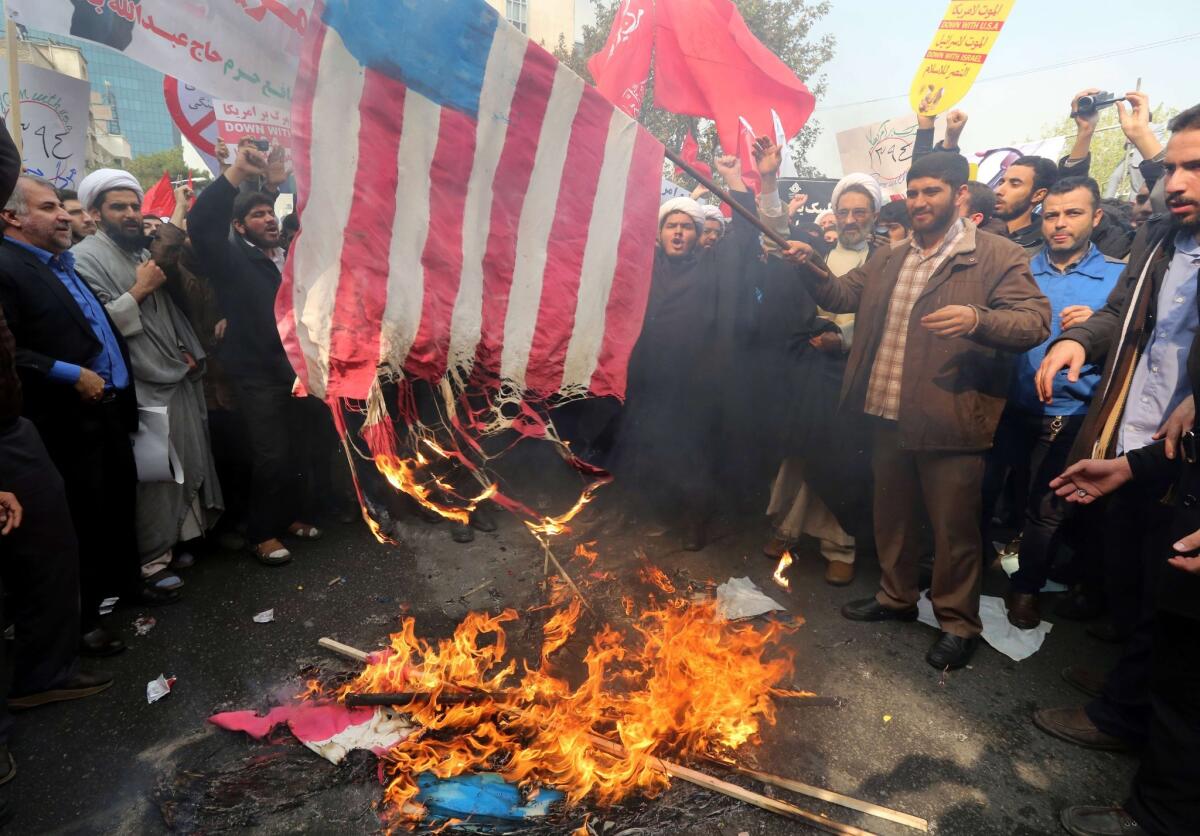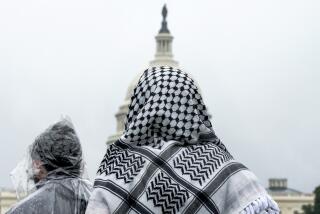Iranians turn out en masse to mark anniversary of U.S. Embassy takeover

Iranians burn an American flag outside the former U.S. Embassy in Tehran on Nov. 4, 2015, during a rally marking the anniversary of its storming by student protesters that triggered a hostage crisis in 1979.
- Share via
Reporting from Tehran — Tens of thousands of protesters gathered across Iran on Wednesday to mark the anniversary of the 1979 takeover of the U.S. Embassy in Tehran.
The annual rally in Tehran, the Iranian capital, drew a larger-than-usual crowd this year, with schoolchildren and workers bused in to rally in front of the “den of espionage,” as the former embassy site is known.
The fact that the anniversary followed the landmark nuclear deal inked in July between Iran and six world powers, including the United States, did not damp enthusiasm. The accord calls for constraints on Iran’s nuclear program in exchange for relief from international economic sanctions that have hobbled Iran’s economy.
Hope that the nuclear deal would lead to warmer relations between Washington and Tehran has to date not been realized.
Hard-liners here opposed to the deal, and aligned against any political rapprochement with Washington, have for weeks been saying that the nuclear agreement does not auger any broader opening to the West.
“Under no circumstances will we allow penetration of Americans in economic, social and cultural areas,” Public Prosecutor Ebrahim Raeisi said in a speech on a platform decorated with placards proclaiming “Down With America” and “Down with Israel.”
The deal has caused consternation in the United States among conservatives and others who call Iran a threat to U.S. security. Republican lawmakers and other critics have vowed to keep trying to kill the nuclear accord.
The rallies in Iran coincide with a crackdown on reformist journalists generally allied with President Hassan Rouhani, who pushed for the nuclear deal. Hard-liners opposed to rapprochement with the West are Rouhani’s greatest adversaries.
A local media site, Sahamnews, reported that 20 journalists regarded as pro-reform had been summoned to speak with the intelligence branch of the powerful Revolutionary Guard Corps. The guard’s chief commander was quoted as assailing “America’s infiltration gang.”
In recent weeks, Iran’s supreme leader, Ayatollah Ali Khamenei, and others have been warning against Western influence sneaking into various aspects of life in the Islamic Republic.
“Influence is not restricted to politics,” Ahmad Tavakkoli, a member of the parliament, warned in a commentary carried by the Alef news service. “The enemy uses any chance to gain influence over our country. But the main goal of the arrogance is to make cultural changes and altering individual and social behavior.”
NEWSLETTER: Get the day’s top headlines from Times Editor Davan Maharaj >>
Wednesday’s rally in Iran marked the 36th anniversary of the seizure of 52 U.S. hostages at the embassy after the Islamic Revolution overthrew U.S.-backed Shah Mohammad Reza Pahlavi.
Participants at the Tehran rally waved Iranian flags in front of large banners, stained with mock blood, featuring likenesses of President Obama. Others torched Obama effigies or U.S. and Israeli flags, and, in more pointed criticism than in recent years, also set fire to the flag of Saudi Arabia, Iran’s regional nemesis and a major U.S. ally.
Iran and Saudi Arabia are at odds on a number of foreign policy issues, notably the conflicts in Syria and Yemen. Tehran is a key backer of Syrian President Bashar Assad, while Saudi Arabia, like the United States, has supported groups seeking to topple Assad. Tehran has been harshly critical of the Saudi bombing campaign in Yemen, which has led to thousands of civilian deaths, according to human rights activists.
Special correspondents Mostaghim reported from Tehran and Bulos from Molyvos, Greece. Times staff writer Patrick J. McDonnell in Homs, Syria, contributed to this report.
ALSO
In Damascus, Syrians express a surprising level of optimism
Ahmad Chalabi dies at 71; former Iraqi exile was leading advocate of 2003 war
Britain halts flights to Sharm el-Sheikh amid fears that Russian jet was downed by bomb
More to Read
Sign up for Essential California
The most important California stories and recommendations in your inbox every morning.
You may occasionally receive promotional content from the Los Angeles Times.














